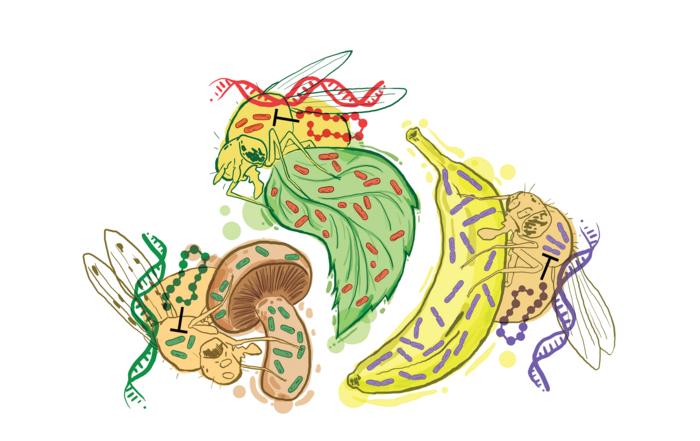Immune systems develop specific genes to combat common bacteria such as those found in food, new research shows.

Credit: Diego Galagovsky
Immune systems develop specific genes to combat common bacteria such as those found in food, new research shows.
Previous theories have suggested that antimicrobial peptides – a kind of natural antibiotics – have a general role in killing a range of bacteria.
However, the new study, published in Science, examined how the immune systems of fruit flies are shaped by the bacteria in their food and environment.
The researchers, from the Swiss Federal Institute of Technology and the University of Exeter, found two peptides that each control a single bacterial species commonly encountered by the flies.
“We know that an animal’s food and environment determine the bacteria it encounters,” said Dr Mark Hanson, from the Centre for Ecology and Conservation on Exeter’s Penryn Campus in Cornwall.
“This in turn shapes its ‘microbiome’ – the collection of microbes that live in and on its body – and our study shows how immune systems evolve in response to this, to control common bacteria that could otherwise cause harm.
“In immune terms, it proves the saying ‘you are what you eat’ – the flies’ immune systems contain peptides with remarkably specific functions for controlling common bacteria.”
One such bacterium – Acetobacter, found in the fruits that flies eat (and in fruits humans eat) – can harm flies if it escapes the gut and reaches the bloodstream.
But the study shows various fly species have a specific peptide (Diptericin B) to control Acetobacter.
“This peptide is the silver bullet that kills this specific bacterium,” Dr Hanson explained.
“Without it, flies are extremely vulnerable because Acetobacter is so common in rotten fruit.”
The study also finds evidence of “convergent evolution” – when separate species evolve similar responses to challenges in their environment.
In this case, fly species in the study diverged from a common ancestor about 100 million years ago, yet they both evolved a Diptericin B peptide to control Acetobacter.
Meanwhile, closely related fly species that do not feed on fruit have lost their Diptericin B peptides over time, because Acetobacter is no longer common in their environment.
Dr Hanson said this evolutionary process might help to explain human susceptibility to certain infections.
“The way our bodies fight infections is really complex. But this sort of research helps us to view our immune system in a new light,” he said.
“I hope it gets us to ask why our immune system is made the way it is. That can help us fight infections, including infections that resist antibiotics.
“Studies like this produce fundamental observations about life, and in turn these can have crucial applications in the world around us.”
The research was funded by the Swiss National Science Foundation and Novartis Foundation.
The paper is entitled: “Ecology-relevant bacteria drive the evolution of host antimicrobial peptides in Drosophila.”
Journal
Science
DOI
10.1126/science.adg5725
Article Title
Ecology-relevant bacteria drive the evolution of host antimicrobial peptides in Drosophila
Article Publication Date
20-Jul-2023




